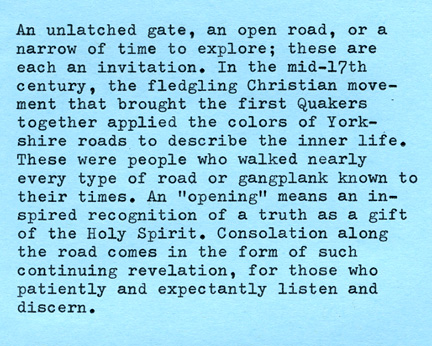
“For in the realm of the spirit
heaven is as near up as it is down,
behind as before, to left or to right.
The loftiest and surest way to heaven
is measured by desires
and not by miles.
The one who longs to be there
really is there in spirit.”
~ The Cloud of Unknowing, chapter 60
Two beachcombers stopped to talk, as I busily wrote aperch on a rock. “Is that your journal? Are you writing poems?” “It is,” I answered, “but I’m just making notes about the day.” “That’s awesome,” one of them said. In response I asked, “do you write poems?” “I did when I was young,” replied the girl who looked no older than ten; “now we draw lots of mermaids- like this!” They proudly displayed one of their notebooks. “Definitely awesome,” I said, later remembering myself as a ten year old that used to say, “when I was young.”
With time and distance, there are increasingly more complex things of which the mind must make sense. Measures and increments. We refer to how many years ago, or jobs ago, or who was with us- and the places, tasks, titles, and names apply measure to time. Interacting our lives with time and space leads to the necessity of comprehending their quantities.

In the midst of desert wilderness, ends are not within sight; if they could be, an interminable trudge would seem more a definable sojourn. Alas, we cannot know the duration of a temporal condition. Using the standard measures of time when referring back to, say, the time between completing grad school and that first serious full-time job, the words three-and-a-half years roll forth with an ease that dishonors the countless miles, missed meals, hopeful presentations, and nerve-wracking poverty. And those rejection letters: I’d made a rule for myself that no rejection letter was to cross the threshold into my apartment. Spans such as three-and-a-half years are lived in hours, days, weeks, and blurs. Measuring devices provide some degree of command over the portioning of areas and amounts. It is for the individual soul to determine scales of importance, thus using personal significance to establish proportion. Having this in mind, perhaps there is asymmetry in our measuring of time- and even time itself. Consider how ages 12 to 17 covered five years; so did 25 to 30. Five years is five years. Well, perhaps not as simply as that. There are proportions, experiences, and what we archivists call enduring value. These defy measurement.
With time lived, and distances experienced and navigated, comes a reckoning with procedure. Progress manifests in steps. Structures are constructed in phases. Foundations precede roofs, a chassis is built before an interior is detailed. When conserving a book, I don’t encase gathers of pages (called signatures) before binding them first. I had to learn to patiently wait out an adhesive’s curing process. By contrast, it requires precise rapidity to be able to carry out paper repair procedures. Part of the continued cultivation of patience is through appreciating sequence. An increased comprehension of progress helps develop perceptive abilities.

Lest more time and opportunities elude my reach, I hope to better perceive my context. How else to arrive at a cultivated sense of vision, between impatiently desiring this trait- and by incidental endurance? To envision does incorporate a perspective that refers back to the times and lives of enterprises and projects, as well as looking ahead without encumbrance. Balancing between the jaundiced pitfall-knowing eye and seeing open-ended potential as it presents. Remembering archival principles, when faced with massive quantities of unorganized records, we archivists must first establish intellectual control over the material. This means to get a sense of the documents we’re to preserve and for which to create access tools. If there’s no discernable order or provenance (origin), we must impose a coherent classification, with respect to the sources (or roots) of the records. In a similar sense, it is for the perceptive soul to size up the overabundance, and apply principles of context appraisal, provenance, and ascertain evidentiary value. With perspective, I can appreciate confluences of terminology and import them freely into my own context. The impulse to organize and preserve must be checked, however, lest there be an unnecessary strain to uphold obstructive and stagnating notions.

Even with a sense of my roots and a remembrance of the providential, I often wonder how to look forward. The unknowing may be just as helpful as the corpus of all that I do know. Though having a sense of direction, the course to chart is of unknown measure. And even by making notes about the day, recording them with written words, it is a one-way travel. With shoulder to the plow, there’s no heading back- certainly not beyond reflection through historic record.
I’d like to think there is more reason to prefer the future to the past. It’s still a good idea to look forward, even with no apparent place to go. The time being is of an unseen duration. There remains the near, the manageable future, which has some delineated measure. This evening after work, having fulfilled my obligations, I’ll have time to write. A modest and attainable goal. Indeed, there are the grander ones, too, providing plenty of bucket list lining material. “Bear well in mind,” wrote Saint-Exupéry in Citadelle, “ that your whole past was but a birth and becoming.” For him, the desert represented the mind. This occurs to my thoughts, as so much around me appears as deserted places. The adventures we all live contain lessons, and perhaps mine at present is to see what I can create in a persisting desert. The past is definable and can be analyzed. The present and immediate future are the waters now plied. Their distant extremities cannot be measured or defined. Without grasp, comfort must then be taken in the Unsearchable and Immeasurable.


























